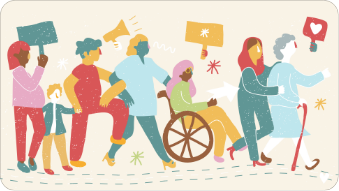Purpose of the Pledge
World YWCA’s purpose is to develop the leadership and collective power of women and girls around the world to achieve justice, peace, health, human dignity, freedom and a sustainable environment.
This International Women’s Day, World YWCA seeks to gain support from both within and around the YWCA movement to affirm and formalise a commitment to the inclusion of LGBTIQ people and their rights via the method of a global pledge.
This pledge creates a foundation for shared, intergenerational, global advocacy that drives change for LGBTIQ people and transforms power structures for gender equality.
As the world comes together to recognise women in leadership and their role in achieving an equal future in a COVID-19 world and beyond, World YWCA urges you to sign this pledge to reinforce the strength that diversity brings to global movements for gender justice and equality.

72 countries still criminalise LGBTIQ people

Help us support and advocate for LGBTIQ people with two simple actions
Some Key Definitions

LGBTIQ
LGBTIQ is the most modern, inclusive way of grouping people in the community. It stands for Lesbian, Gay, Bisexual, Trans and gender diverse, Intersex, Queer and questioning.

Transphobia
Transphobia refers to negative beliefs, prejudices and stereotypes that exist about transgender/trans and gender diverse people.

Sexuality/Sexual Orientation:
Sexuality, or sexual orientation describes a person’s sexual attraction to others.

Pronouns
Pronouns are often used to refer to someone in relation to their gender. For example, referring to a man, many people often use the pronoun ‘he’, or ‘she’ for a woman. The gender-neutral pronoun of ‘they’ is often preferred by some in the LGBTIQ communities.

Misgendering
Misgendering is an occurrence where a person is described or addressed using language that does not match their gender identity. This can include the incorrect use of pronouns (she/he/they), familial titles (father, sister, uncle) and, at times, other words that traditionally have gendered applications (pretty, handsome, etc.). It is best to ask a person, at a relevant moment, what words they like to use.





